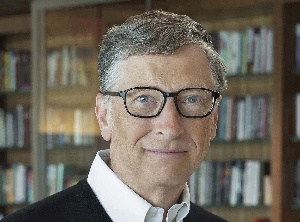Africa News of Tuesday, 3 June 2025
Source: www.ghanawebbers.com
Africa: Child in Africa 50 Times More Likely to Die Before Age Five - Bill Gates
Billionaire philanthropist Bill Gates spoke about health inequalities in Africa. He noted that children born in some African regions are 50 times more likely to die before age five than those in wealthier countries. Gates made these remarks on Monday at the African Union headquarters in Addis Ababa. He reflected on 25 years of work by the Bill and Melinda Gates Foundation.
Despite progress, most child deaths under five still happen in low-income countries. Gates called this situation "profoundly unjust." He emphasized that the fight to save young lives is ongoing. However, he also recognized Africa's achievements in reducing child deaths through partnerships and investments in healthcare.
Gates highlighted significant progress over the past 25 years. Under-five deaths have dropped from nearly 10 million to well under five million. This reduction is faster than any previous period in history. He credited increased vaccine access and stronger health systems for this improvement.
The foundation has focused on fighting infectious diseases like HIV, malaria, tuberculosis, and polio. These diseases heavily impact African children and families. Gates noted that HIV deaths peaked early this century but have since fallen by 70 percent due to partnerships like the Global Fund. He praised Zimbabwe for its high rates of HIV treatment coverage.
Malaria remains a challenging issue, with evolving resistance to treatments. Gates believes there is potential to eradicate malaria within 20 years through tailored innovations for Africa's needs. The foundation developed a $2 rotavirus vaccine that previously cost $30 and introduced affordable bed nets for malaria prevention.
He also mentioned the near eradication of polio in Nigeria, which began long before the foundation was established. Tackling malnutrition is another concern for Gates. Even surviving children may suffer long-term damage from poor nutrition.
He pointed out that 40 percent of children in sub-Saharan Africa face serious health deficits affecting their development. "Fixing a child's nutrition at age five or six is too late," he warned, stressing the importance of maternal health during a child's first 1,000 days.
Gates called malnutrition an even greater challenge than malaria or HIV and urged more investment in nutrition solutions and early intervention strategies.
Paulin Basinga, director of the Gates Foundation's Africa division, described Gates' message as a call to action for African governments. He emphasized prioritizing health within national development plans can unlock growth opportunities.
Selma Haddadi, Deputy Chairperson of the African Union Commission, reaffirmed commitment to Agenda 2063. She stressed strengthening food sovereignty, climate resilience, and health systems across Africa is urgent.
Haddadi also highlighted youth empowerment through education and innovation as crucial for development while underscoring women's roles in this journey.











